University Healthcare Report: Evidence-Based Practice Fundamentals
VerifiedAdded on 2023/02/02
|20
|2145
|98
Report
AI Summary
This report provides a comprehensive overview of evidence-based practice (EBP) in healthcare. It begins with an introduction to EBP, emphasizing its role in improving patient outcomes and quality of life. The report then delves into the purpose and process of conducting EBP, outlining the essential steps involved, including formulating persuasive questions, identifying literature, appraising evidence, and implementing findings. It highlights the necessary skills and qualities for conducting literature reviews, both personal and professional, and emphasizes the ethical considerations in conducting research. Furthermore, the report explores communication skills for nurses and their impact on patient care, supported by literature reviews. A research proposal form is presented, focusing on investigating the influence of communication skills on service user outcomes. Finally, the report discusses the positive impact of research on current practice, emphasizing how EBP can improve service delivery and patient satisfaction. The report concludes by reiterating the significance of EBP and effective communication in healthcare.
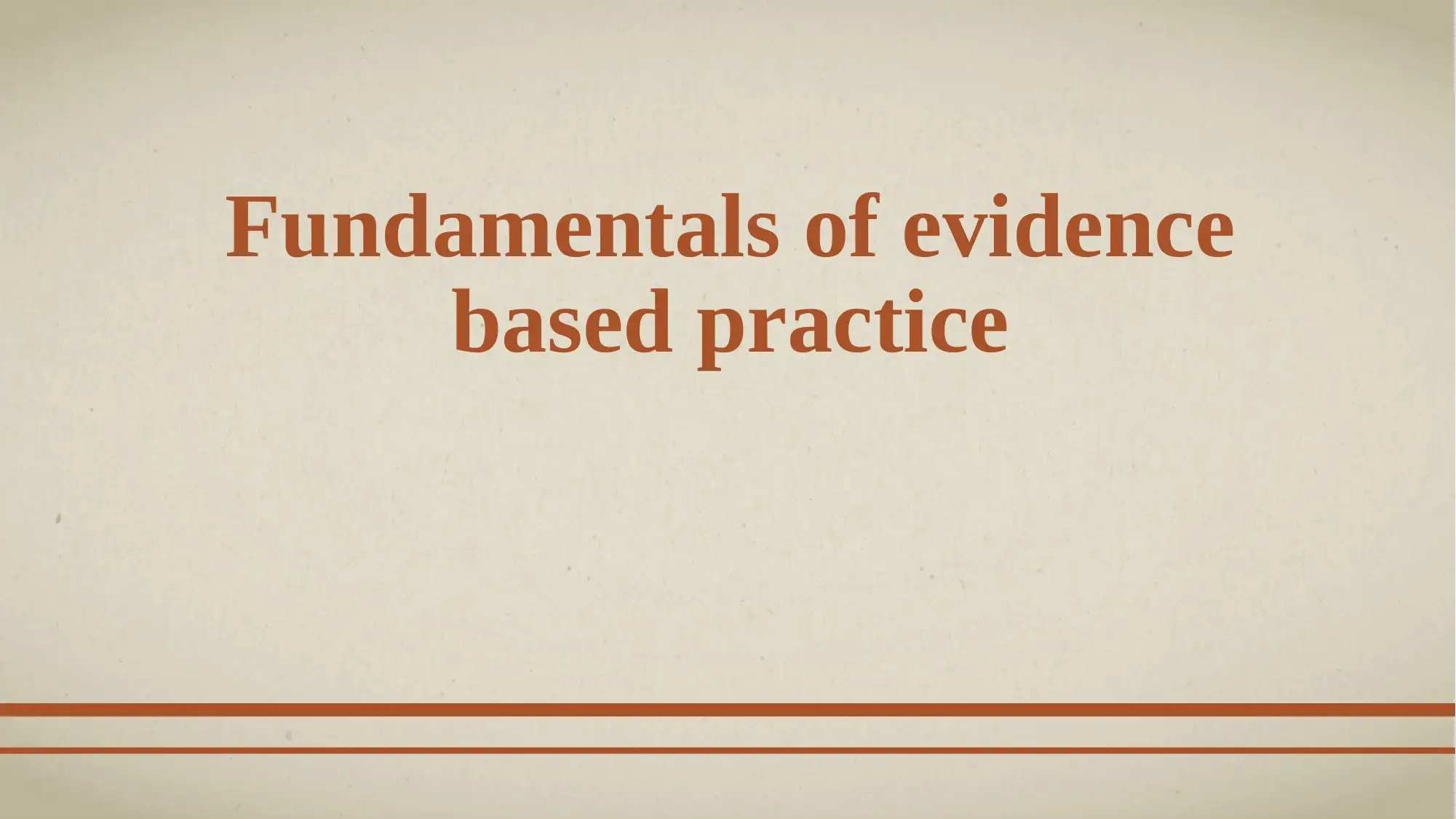
Fundamentals of evidence
based practice
based practice
Paraphrase This Document
Need a fresh take? Get an instant paraphrase of this document with our AI Paraphraser
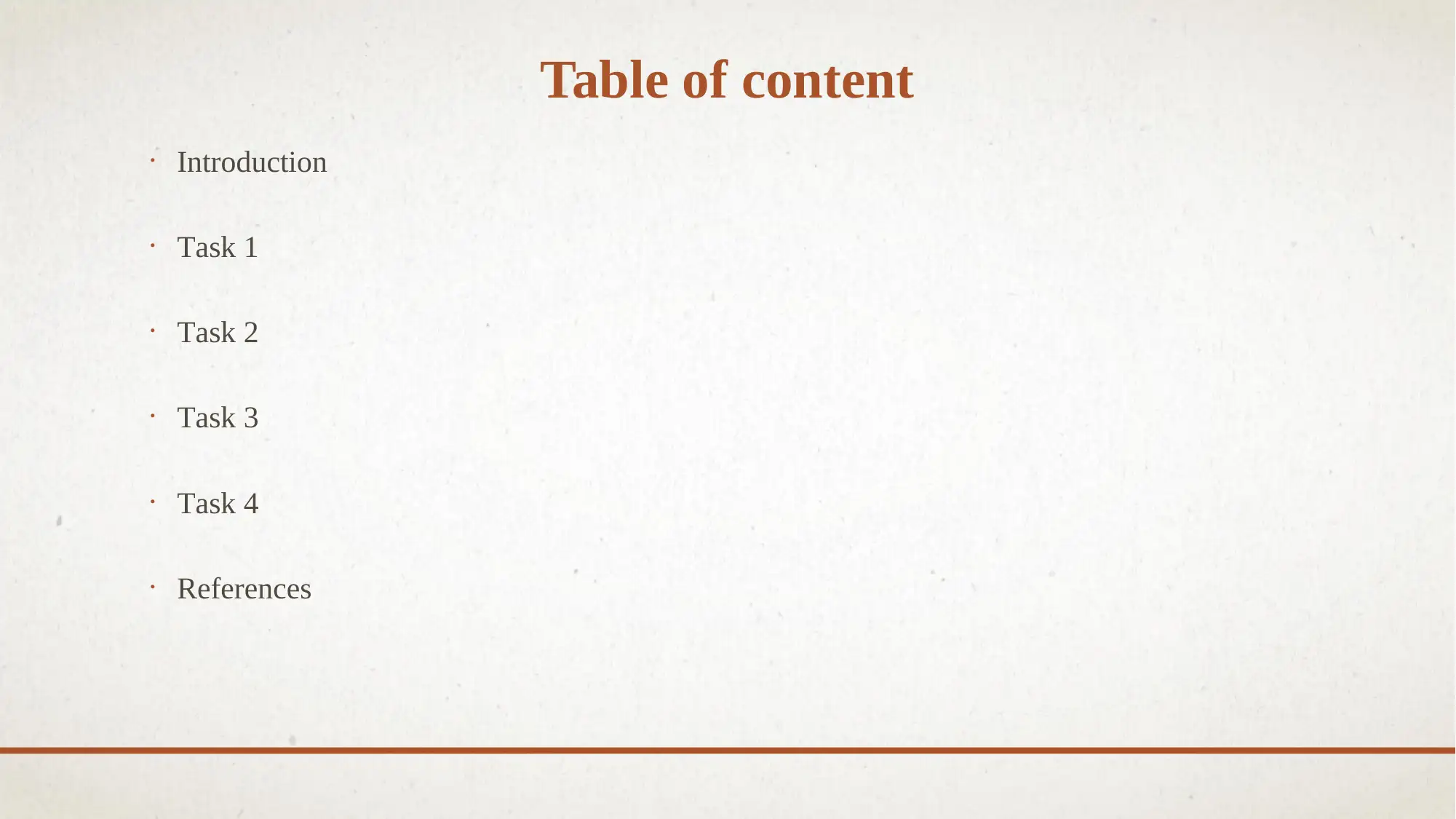
Table of content
• Introduction
• Task 1
• Task 2
• Task 3
• Task 4
• References
• Introduction
• Task 1
• Task 2
• Task 3
• Task 4
• References
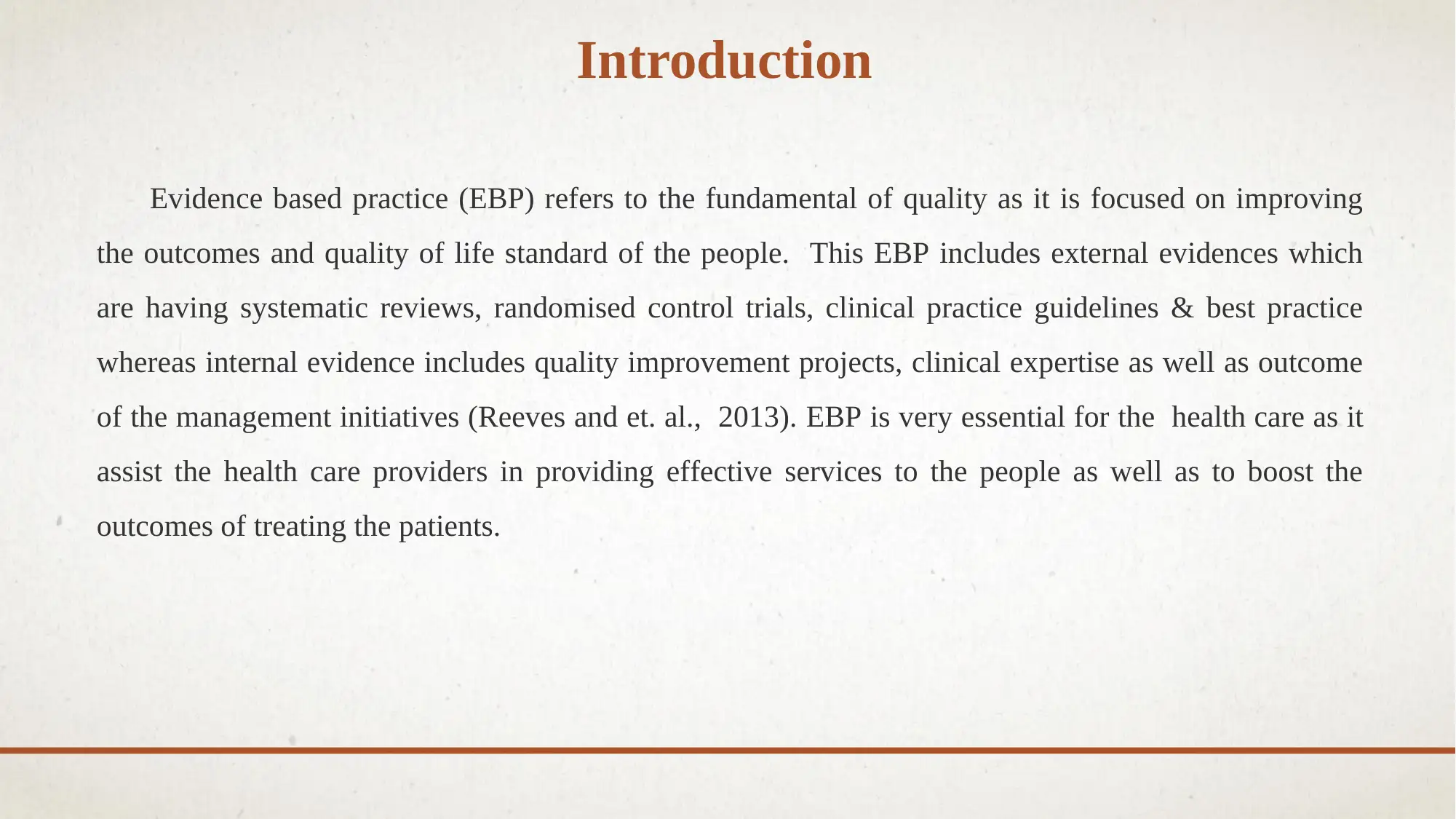
Introduction
Evidence based practice (EBP) refers to the fundamental of quality as it is focused on improving
the outcomes and quality of life standard of the people. This EBP includes external evidences which
are having systematic reviews, randomised control trials, clinical practice guidelines & best practice
whereas internal evidence includes quality improvement projects, clinical expertise as well as outcome
of the management initiatives (Reeves and et. al., 2013). EBP is very essential for the health care as it
assist the health care providers in providing effective services to the people as well as to boost the
outcomes of treating the patients.
Evidence based practice (EBP) refers to the fundamental of quality as it is focused on improving
the outcomes and quality of life standard of the people. This EBP includes external evidences which
are having systematic reviews, randomised control trials, clinical practice guidelines & best practice
whereas internal evidence includes quality improvement projects, clinical expertise as well as outcome
of the management initiatives (Reeves and et. al., 2013). EBP is very essential for the health care as it
assist the health care providers in providing effective services to the people as well as to boost the
outcomes of treating the patients.
⊘ This is a preview!⊘
Do you want full access?
Subscribe today to unlock all pages.

Trusted by 1+ million students worldwide
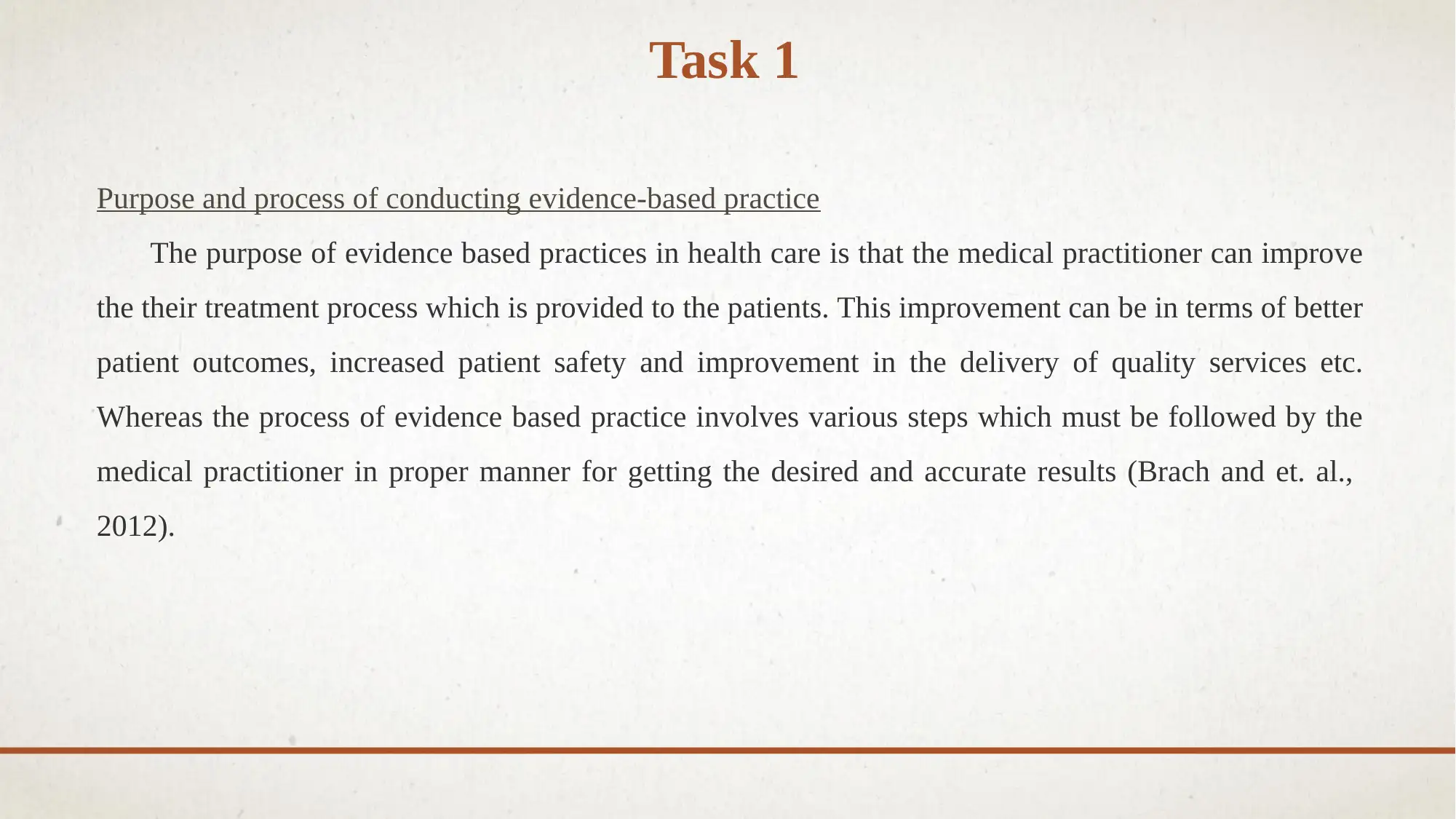
Task 1
Purpose and process of conducting evidence-based practice
The purpose of evidence based practices in health care is that the medical practitioner can improve
the their treatment process which is provided to the patients. This improvement can be in terms of better
patient outcomes, increased patient safety and improvement in the delivery of quality services etc.
Whereas the process of evidence based practice involves various steps which must be followed by the
medical practitioner in proper manner for getting the desired and accurate results (Brach and et. al.,
2012).
Purpose and process of conducting evidence-based practice
The purpose of evidence based practices in health care is that the medical practitioner can improve
the their treatment process which is provided to the patients. This improvement can be in terms of better
patient outcomes, increased patient safety and improvement in the delivery of quality services etc.
Whereas the process of evidence based practice involves various steps which must be followed by the
medical practitioner in proper manner for getting the desired and accurate results (Brach and et. al.,
2012).
Paraphrase This Document
Need a fresh take? Get an instant paraphrase of this document with our AI Paraphraser
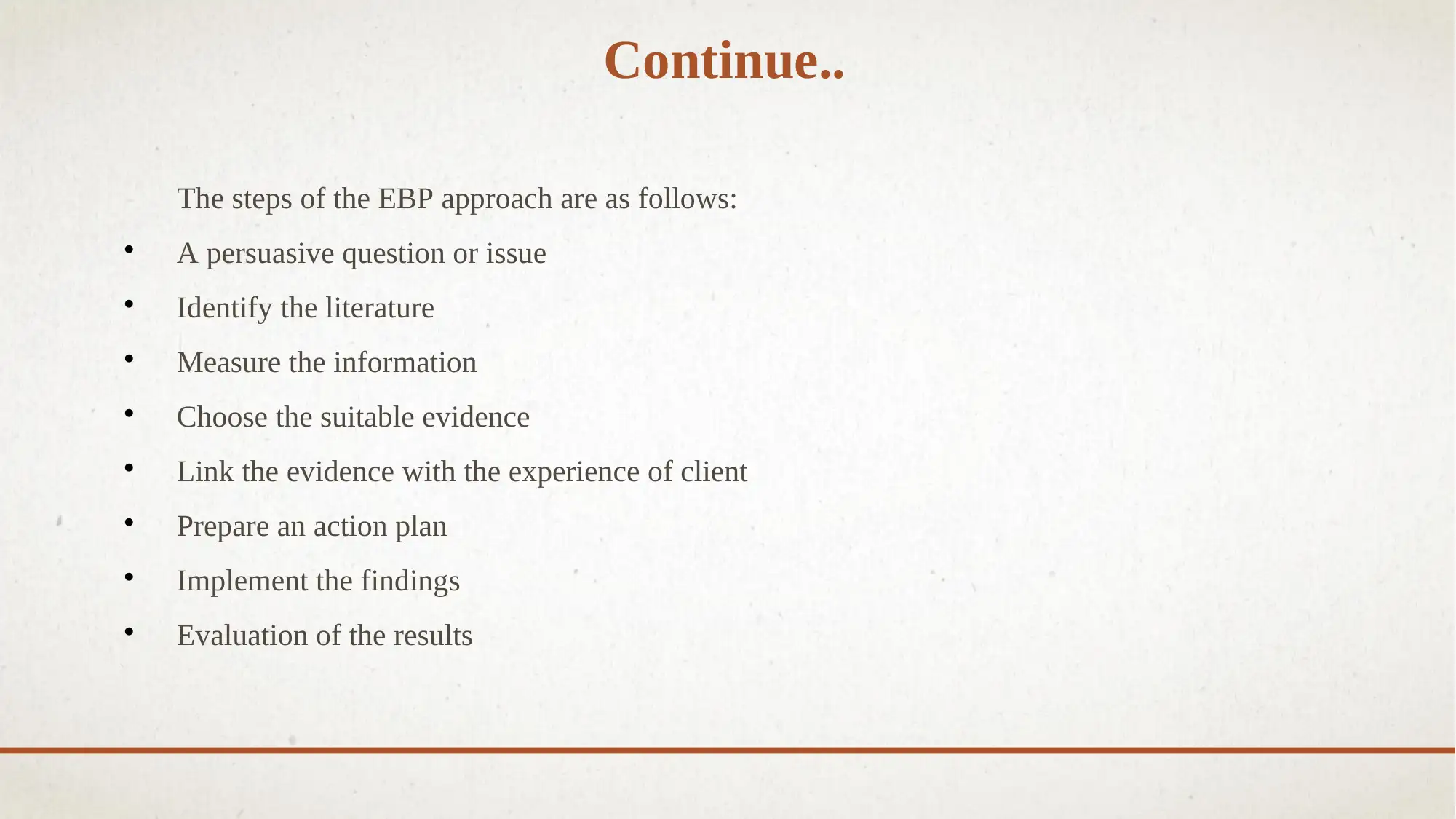
Continue..
The steps of the EBP approach are as follows:
A persuasive question or issue
Identify the literature
Measure the information
Choose the suitable evidence
Link the evidence with the experience of client
Prepare an action plan
Implement the findings
Evaluation of the results
The steps of the EBP approach are as follows:
A persuasive question or issue
Identify the literature
Measure the information
Choose the suitable evidence
Link the evidence with the experience of client
Prepare an action plan
Implement the findings
Evaluation of the results
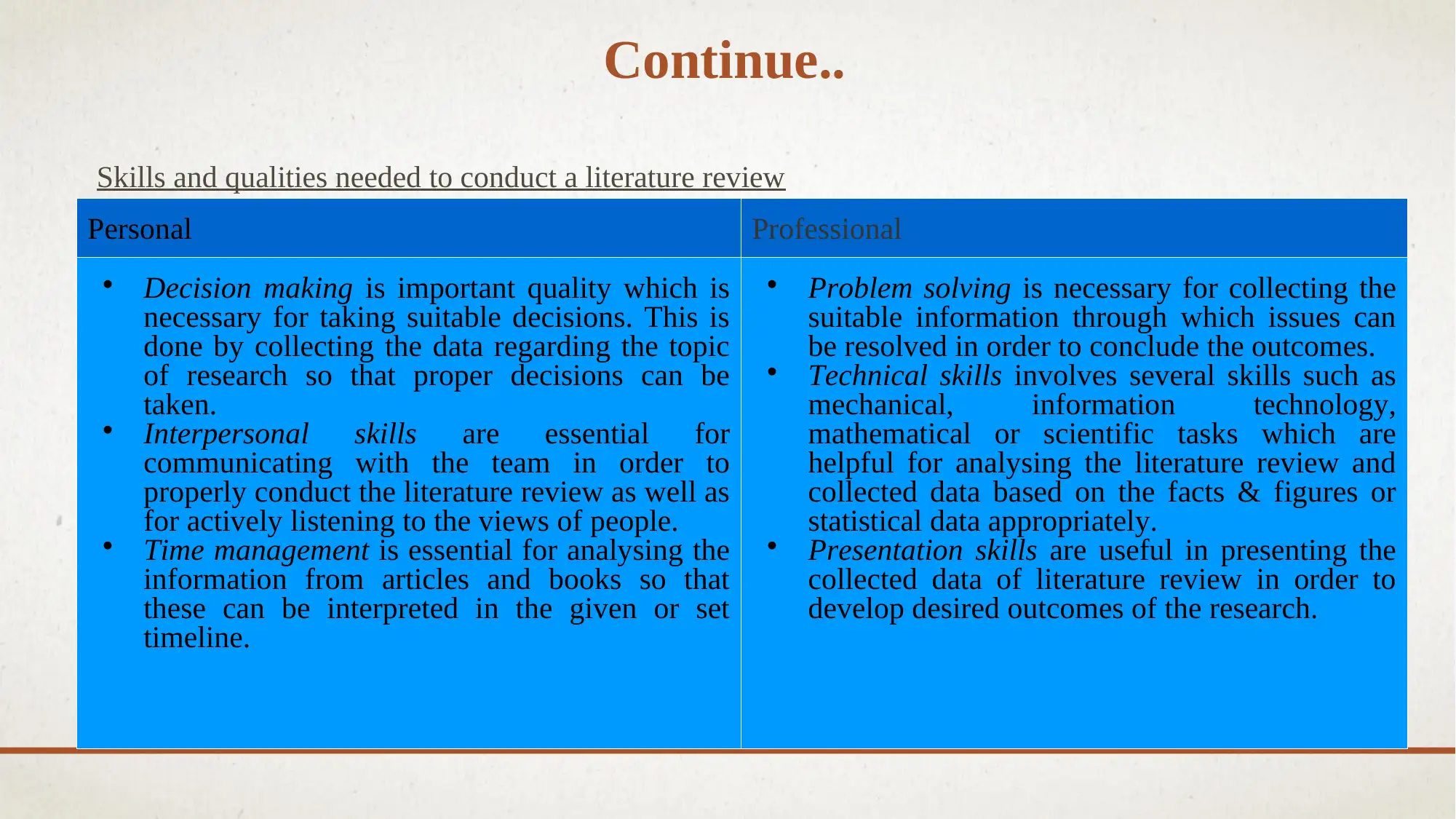
Continue..
Skills and qualities needed to conduct a literature review
Personal Professional
Decision making is important quality which is
necessary for taking suitable decisions. This is
done by collecting the data regarding the topic
of research so that proper decisions can be
taken.
Interpersonal skills are essential for
communicating with the team in order to
properly conduct the literature review as well as
for actively listening to the views of people.
Time management is essential for analysing the
information from articles and books so that
these can be interpreted in the given or set
timeline.
Problem solving is necessary for collecting the
suitable information through which issues can
be resolved in order to conclude the outcomes.
Technical skills involves several skills such as
mechanical, information technology,
mathematical or scientific tasks which are
helpful for analysing the literature review and
collected data based on the facts & figures or
statistical data appropriately.
Presentation skills are useful in presenting the
collected data of literature review in order to
develop desired outcomes of the research.
Skills and qualities needed to conduct a literature review
Personal Professional
Decision making is important quality which is
necessary for taking suitable decisions. This is
done by collecting the data regarding the topic
of research so that proper decisions can be
taken.
Interpersonal skills are essential for
communicating with the team in order to
properly conduct the literature review as well as
for actively listening to the views of people.
Time management is essential for analysing the
information from articles and books so that
these can be interpreted in the given or set
timeline.
Problem solving is necessary for collecting the
suitable information through which issues can
be resolved in order to conclude the outcomes.
Technical skills involves several skills such as
mechanical, information technology,
mathematical or scientific tasks which are
helpful for analysing the literature review and
collected data based on the facts & figures or
statistical data appropriately.
Presentation skills are useful in presenting the
collected data of literature review in order to
develop desired outcomes of the research.
⊘ This is a preview!⊘
Do you want full access?
Subscribe today to unlock all pages.

Trusted by 1+ million students worldwide
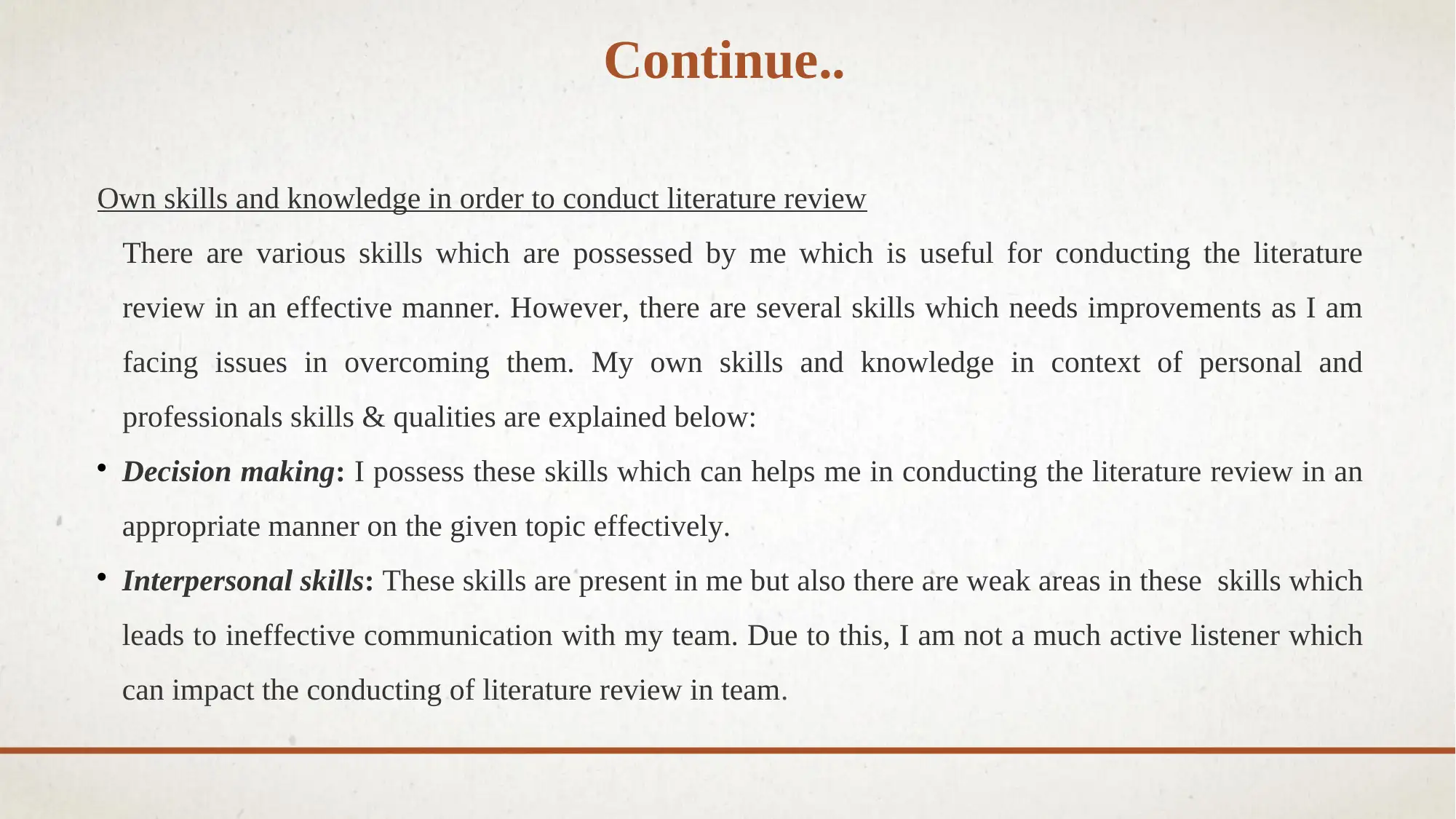
Continue..
Own skills and knowledge in order to conduct literature review
There are various skills which are possessed by me which is useful for conducting the literature
review in an effective manner. However, there are several skills which needs improvements as I am
facing issues in overcoming them. My own skills and knowledge in context of personal and
professionals skills & qualities are explained below:
Decision making: I possess these skills which can helps me in conducting the literature review in an
appropriate manner on the given topic effectively.
Interpersonal skills: These skills are present in me but also there are weak areas in these skills which
leads to ineffective communication with my team. Due to this, I am not a much active listener which
can impact the conducting of literature review in team.
Own skills and knowledge in order to conduct literature review
There are various skills which are possessed by me which is useful for conducting the literature
review in an effective manner. However, there are several skills which needs improvements as I am
facing issues in overcoming them. My own skills and knowledge in context of personal and
professionals skills & qualities are explained below:
Decision making: I possess these skills which can helps me in conducting the literature review in an
appropriate manner on the given topic effectively.
Interpersonal skills: These skills are present in me but also there are weak areas in these skills which
leads to ineffective communication with my team. Due to this, I am not a much active listener which
can impact the conducting of literature review in team.
Paraphrase This Document
Need a fresh take? Get an instant paraphrase of this document with our AI Paraphraser
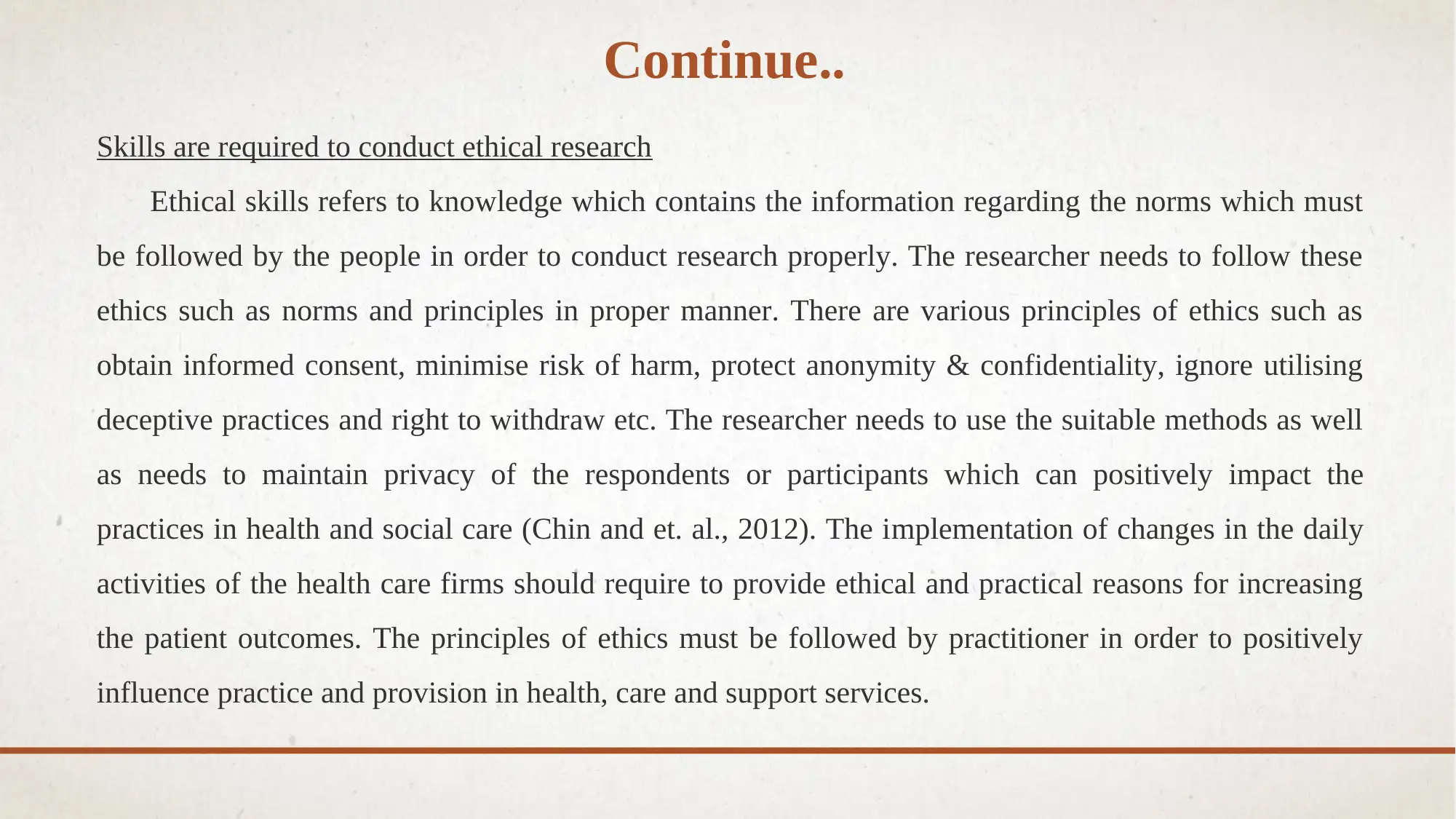
Continue..
Skills are required to conduct ethical research
Ethical skills refers to knowledge which contains the information regarding the norms which must
be followed by the people in order to conduct research properly. The researcher needs to follow these
ethics such as norms and principles in proper manner. There are various principles of ethics such as
obtain informed consent, minimise risk of harm, protect anonymity & confidentiality, ignore utilising
deceptive practices and right to withdraw etc. The researcher needs to use the suitable methods as well
as needs to maintain privacy of the respondents or participants which can positively impact the
practices in health and social care (Chin and et. al., 2012). The implementation of changes in the daily
activities of the health care firms should require to provide ethical and practical reasons for increasing
the patient outcomes. The principles of ethics must be followed by practitioner in order to positively
influence practice and provision in health, care and support services.
Skills are required to conduct ethical research
Ethical skills refers to knowledge which contains the information regarding the norms which must
be followed by the people in order to conduct research properly. The researcher needs to follow these
ethics such as norms and principles in proper manner. There are various principles of ethics such as
obtain informed consent, minimise risk of harm, protect anonymity & confidentiality, ignore utilising
deceptive practices and right to withdraw etc. The researcher needs to use the suitable methods as well
as needs to maintain privacy of the respondents or participants which can positively impact the
practices in health and social care (Chin and et. al., 2012). The implementation of changes in the daily
activities of the health care firms should require to provide ethical and practical reasons for increasing
the patient outcomes. The principles of ethics must be followed by practitioner in order to positively
influence practice and provision in health, care and support services.
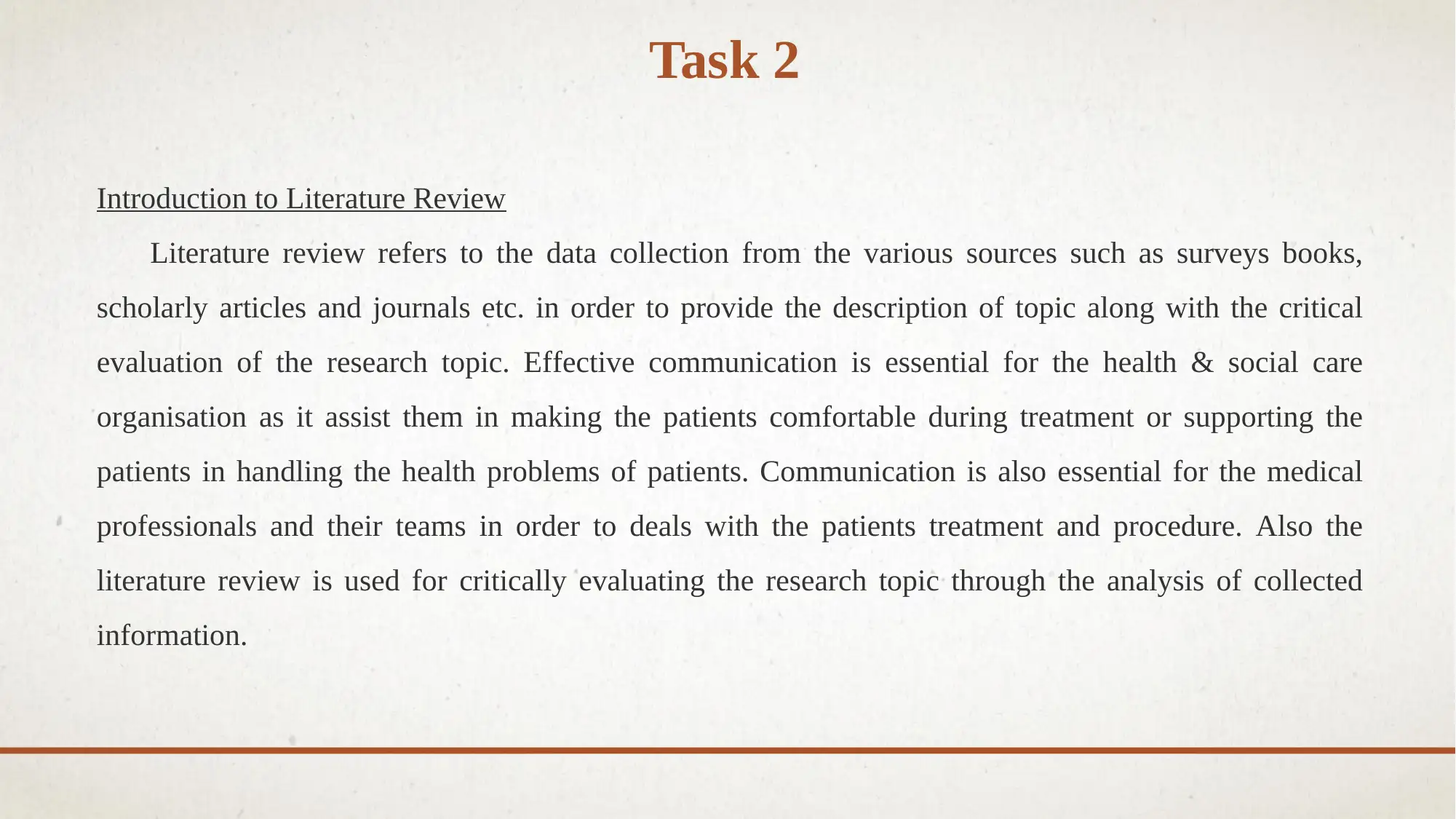
Task 2
Introduction to Literature Review
Literature review refers to the data collection from the various sources such as surveys books,
scholarly articles and journals etc. in order to provide the description of topic along with the critical
evaluation of the research topic. Effective communication is essential for the health & social care
organisation as it assist them in making the patients comfortable during treatment or supporting the
patients in handling the health problems of patients. Communication is also essential for the medical
professionals and their teams in order to deals with the patients treatment and procedure. Also the
literature review is used for critically evaluating the research topic through the analysis of collected
information.
Introduction to Literature Review
Literature review refers to the data collection from the various sources such as surveys books,
scholarly articles and journals etc. in order to provide the description of topic along with the critical
evaluation of the research topic. Effective communication is essential for the health & social care
organisation as it assist them in making the patients comfortable during treatment or supporting the
patients in handling the health problems of patients. Communication is also essential for the medical
professionals and their teams in order to deals with the patients treatment and procedure. Also the
literature review is used for critically evaluating the research topic through the analysis of collected
information.
⊘ This is a preview!⊘
Do you want full access?
Subscribe today to unlock all pages.

Trusted by 1+ million students worldwide
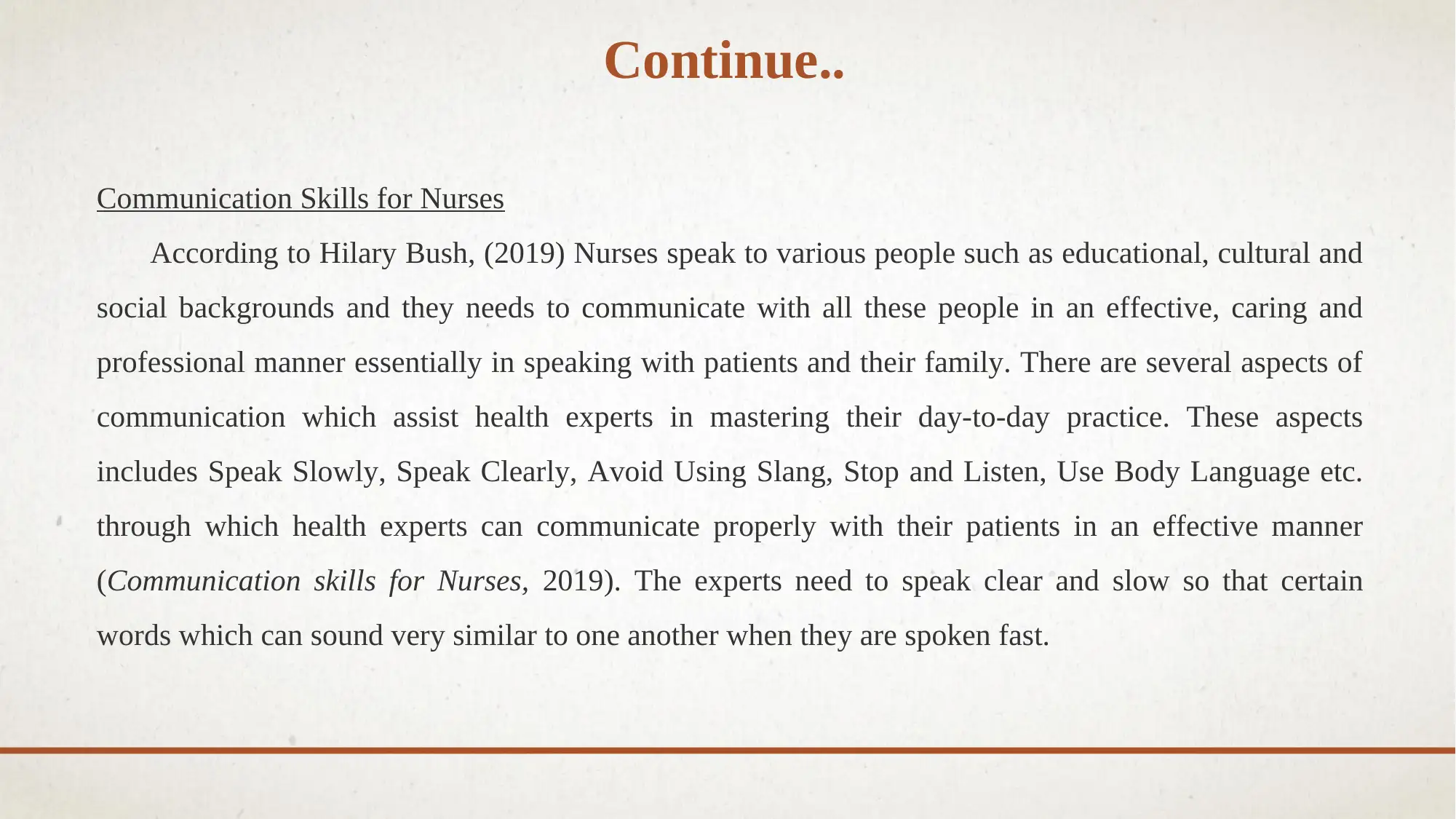
Continue..
Communication Skills for Nurses
According to Hilary Bush, (2019) Nurses speak to various people such as educational, cultural and
social backgrounds and they needs to communicate with all these people in an effective, caring and
professional manner essentially in speaking with patients and their family. There are several aspects of
communication which assist health experts in mastering their day-to-day practice. These aspects
includes Speak Slowly, Speak Clearly, Avoid Using Slang, Stop and Listen, Use Body Language etc.
through which health experts can communicate properly with their patients in an effective manner
(Communication skills for Nurses, 2019). The experts need to speak clear and slow so that certain
words which can sound very similar to one another when they are spoken fast.
Communication Skills for Nurses
According to Hilary Bush, (2019) Nurses speak to various people such as educational, cultural and
social backgrounds and they needs to communicate with all these people in an effective, caring and
professional manner essentially in speaking with patients and their family. There are several aspects of
communication which assist health experts in mastering their day-to-day practice. These aspects
includes Speak Slowly, Speak Clearly, Avoid Using Slang, Stop and Listen, Use Body Language etc.
through which health experts can communicate properly with their patients in an effective manner
(Communication skills for Nurses, 2019). The experts need to speak clear and slow so that certain
words which can sound very similar to one another when they are spoken fast.
Paraphrase This Document
Need a fresh take? Get an instant paraphrase of this document with our AI Paraphraser
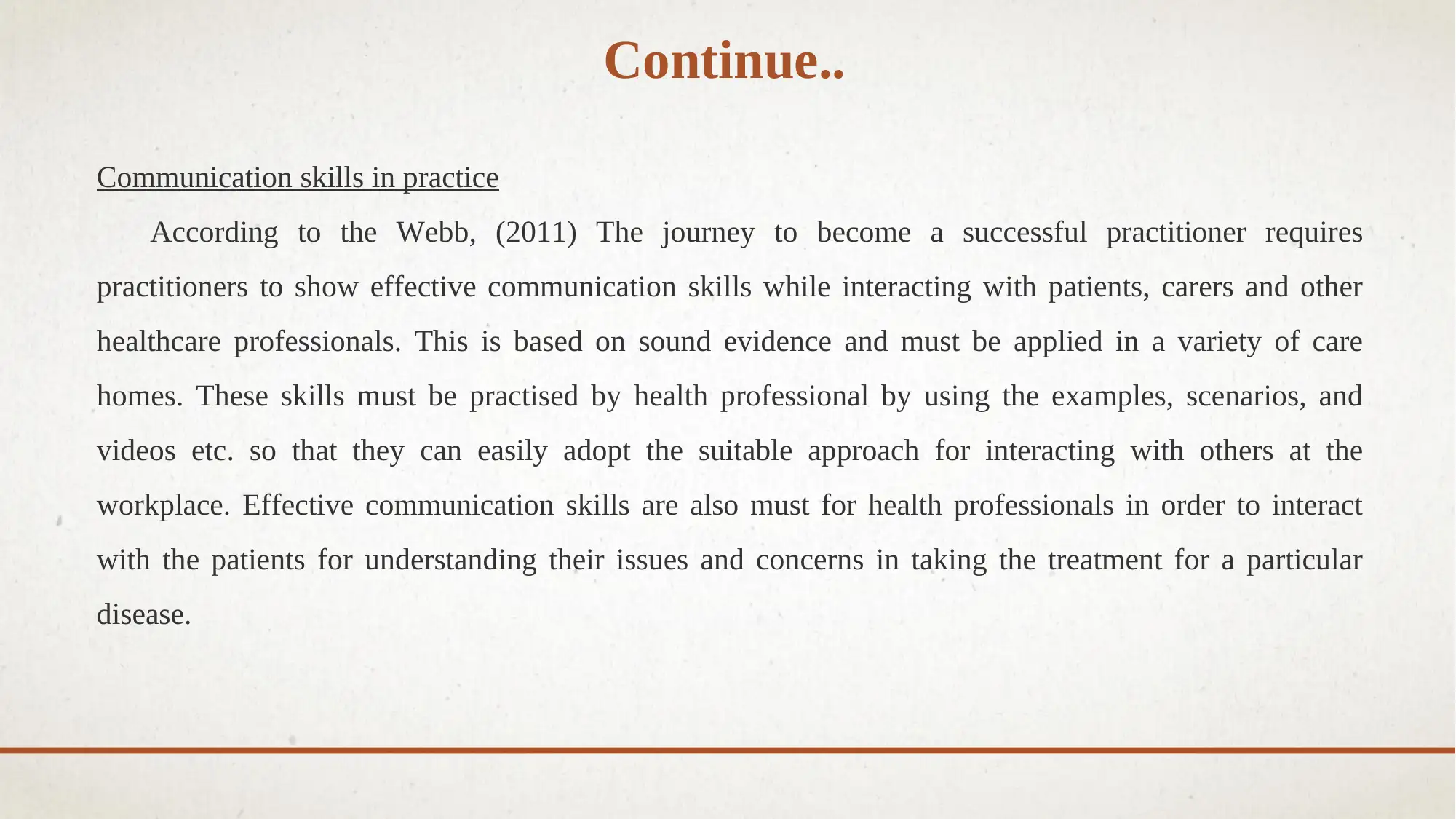
Continue..
Communication skills in practice
According to the Webb, (2011) The journey to become a successful practitioner requires
practitioners to show effective communication skills while interacting with patients, carers and other
healthcare professionals. This is based on sound evidence and must be applied in a variety of care
homes. These skills must be practised by health professional by using the examples, scenarios, and
videos etc. so that they can easily adopt the suitable approach for interacting with others at the
workplace. Effective communication skills are also must for health professionals in order to interact
with the patients for understanding their issues and concerns in taking the treatment for a particular
disease.
Communication skills in practice
According to the Webb, (2011) The journey to become a successful practitioner requires
practitioners to show effective communication skills while interacting with patients, carers and other
healthcare professionals. This is based on sound evidence and must be applied in a variety of care
homes. These skills must be practised by health professional by using the examples, scenarios, and
videos etc. so that they can easily adopt the suitable approach for interacting with others at the
workplace. Effective communication skills are also must for health professionals in order to interact
with the patients for understanding their issues and concerns in taking the treatment for a particular
disease.
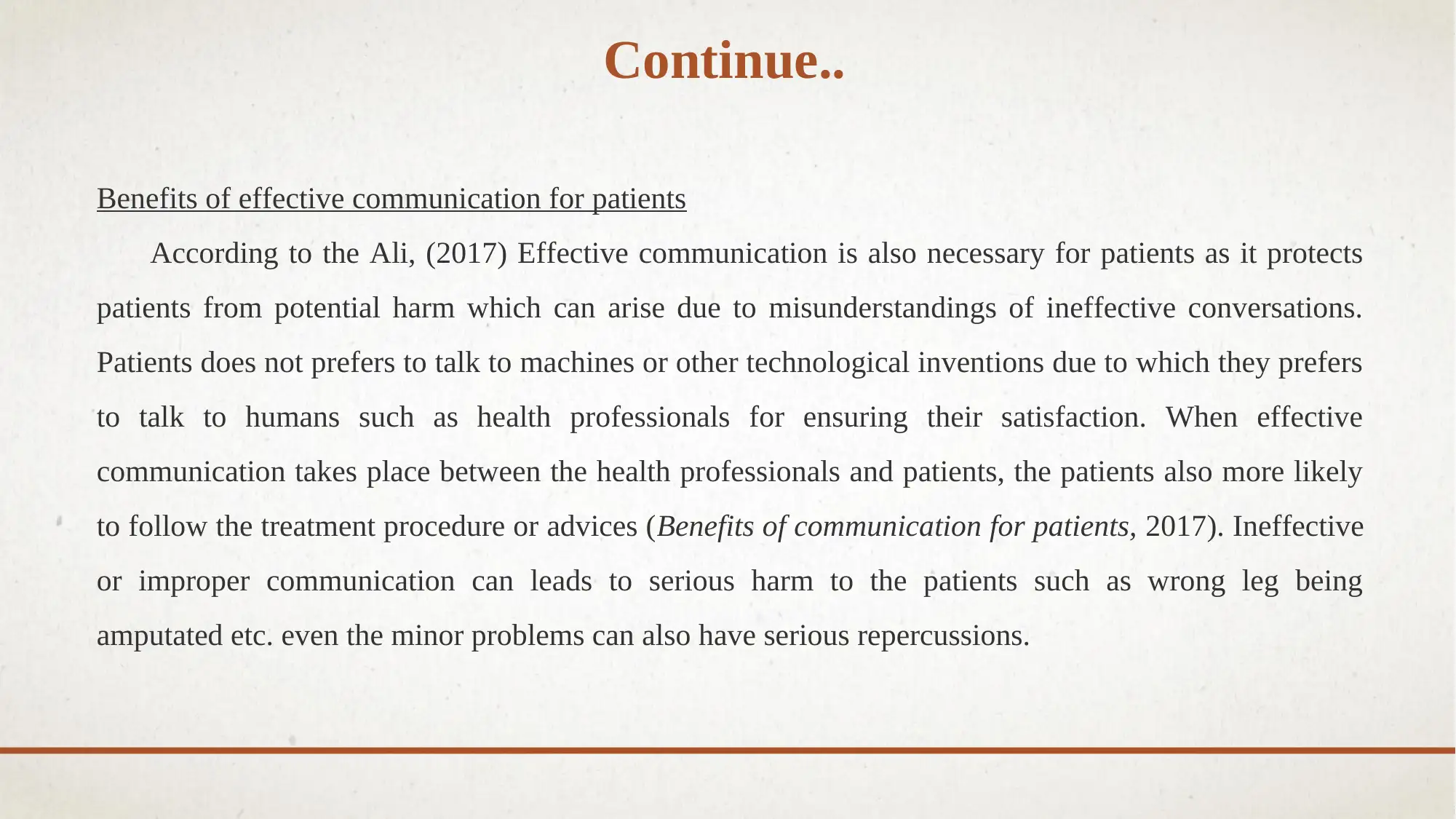
Continue..
Benefits of effective communication for patients
According to the Ali, (2017) Effective communication is also necessary for patients as it protects
patients from potential harm which can arise due to misunderstandings of ineffective conversations.
Patients does not prefers to talk to machines or other technological inventions due to which they prefers
to talk to humans such as health professionals for ensuring their satisfaction. When effective
communication takes place between the health professionals and patients, the patients also more likely
to follow the treatment procedure or advices (Benefits of communication for patients, 2017). Ineffective
or improper communication can leads to serious harm to the patients such as wrong leg being
amputated etc. even the minor problems can also have serious repercussions.
Benefits of effective communication for patients
According to the Ali, (2017) Effective communication is also necessary for patients as it protects
patients from potential harm which can arise due to misunderstandings of ineffective conversations.
Patients does not prefers to talk to machines or other technological inventions due to which they prefers
to talk to humans such as health professionals for ensuring their satisfaction. When effective
communication takes place between the health professionals and patients, the patients also more likely
to follow the treatment procedure or advices (Benefits of communication for patients, 2017). Ineffective
or improper communication can leads to serious harm to the patients such as wrong leg being
amputated etc. even the minor problems can also have serious repercussions.
⊘ This is a preview!⊘
Do you want full access?
Subscribe today to unlock all pages.

Trusted by 1+ million students worldwide
1 out of 20
Related Documents
Your All-in-One AI-Powered Toolkit for Academic Success.
+13062052269
info@desklib.com
Available 24*7 on WhatsApp / Email
![[object Object]](/_next/static/media/star-bottom.7253800d.svg)
Unlock your academic potential
Copyright © 2020–2026 A2Z Services. All Rights Reserved. Developed and managed by ZUCOL.




